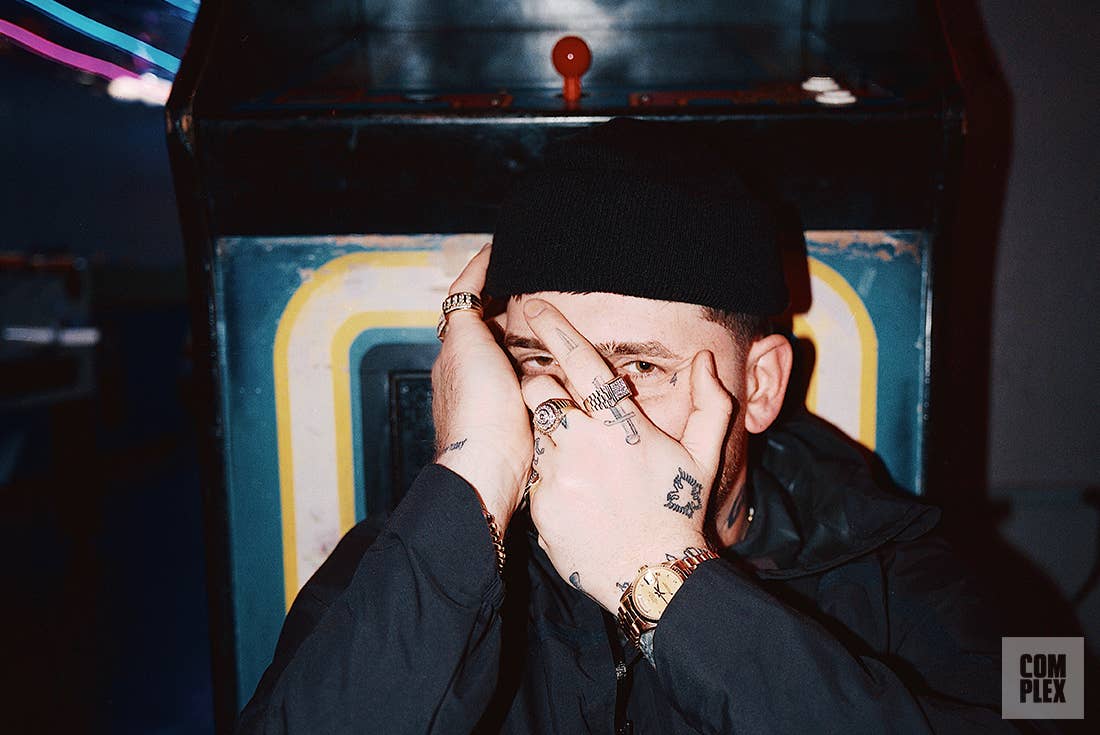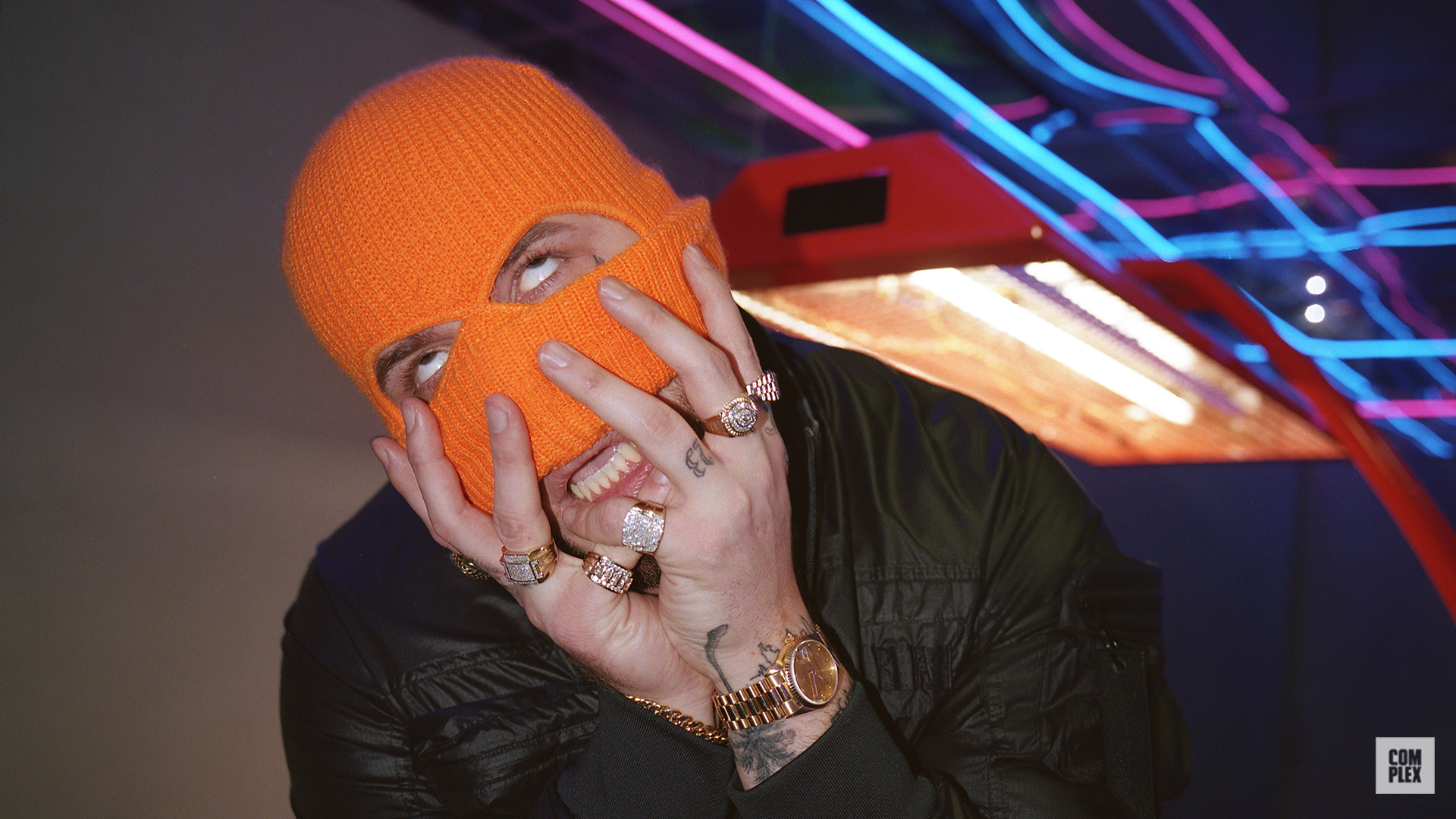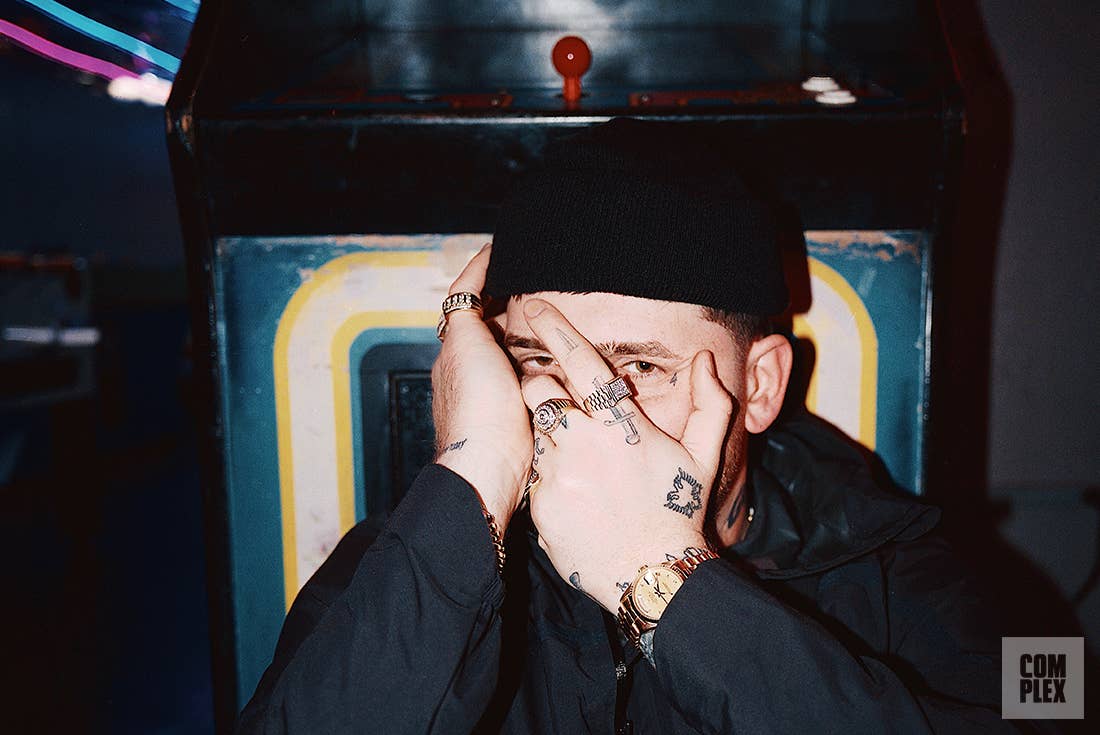
What does home look like in 2018? For many of us, the same as it always did—the house we grew up in, the streets we learned to ride a bike on, or the neighborhood that shaped our formative years. But not all of us are lucky enough to have had those experiences. Every week on the news, we hear about asylum seekers arriving at invisible borders with tangible dreams, hoping to find a new home.
For Gashi, that feeling is all too familiar. The emerging recording artist is the son of Albanian refugees from Kosovo. Born in Libya, he and his family lived in 24 countries before arriving to the United States and settling in the Flatbush/Kensington area of Brooklyn, New York in 2001. After more moves than most of us will experience in our lifetime, Gashi has a rather simple vision of home.
“To me, home is family all in one living room, watching Home Alone near the fireplace," Gashi says earnestly. "I want to have that same exact house [as Home Alone] in New Jersey, and I want to fill it with all my family members. During the holidays, I want people wearing ugly sweaters and watching TV.”
It’s a humble visual, especially for someone who worked with Nipsey Hussle and French Montana on his first mixtape, and who raps about diamonds and Wraiths. But for a refugee, it makes perfect sense; it’s an image of stability, of contentment. Of peace.
“To me, home is family all in one living room, watching ‘Home Alone’ near the fireplace.”
That’s why when it comes to the state of immigration today, Gashi is confused. “The United States is built on immigrants,” he begins. “All these cultures in one place—that keeps this country running. So to see people put a wall up and say no more immigrants can come into this country, that makes no sense to me. People come here for a better life; that’s what my parents did for me.”
Growing up in a cultural hub like Brooklyn, Gashi, whose full name is Labinot Gashi, recalls attending Trinidadian and Jamaican parties. As an immigrant among other immigrants, his dream was to be on BCAT, a New York Public Access television station “designed to interest Brooklyn residents whose origins are from outside the United States.”
Though one might expect these experiences to have steered Gashi towards music, he traces his earliest memories of the art form back to Libya.
“The first time I saw a TV, Michael Jackson was on it. I said to myself, ‘This is who I want to be like. I want to moonwalk,’” Gashi reveals, with hints of boyishness coming through his voice. “As I traveled to [other] countries, I started to see more musicians. I got into *NSYNC, the Backstreet Boys, Prince, and Ozzy Osbourne.”

It was Gashi’s older brother who introduced him to hip-hop. “[While living] in Germany, my brother stole the Wu-Tang album. Actually, [he] made me do it,” Gashi says. “He would turn [my other music] off and we’d listen to hip-hop and rap.”
One thing Brooklyn did directly influence was Gashi’s fashion sense, which developed at an early age. “It was a more baggy era,” he recalls. “I was wearing Ecko and Iceberg. Then in seventh grade, I was introduced to Kanye and Pharrell; they influenced my music and my fashion. In eighth grade, I got a job, and I got my Pradas and my BAPE.”
Today, Gashi counts Tyler, The Creator as his main fashion icon, and feels positively about the cyclical nature of the industry. He remembers first coming across a “dad shoe” in Germany in the ’90s, and finds it “beautiful” to see classic styles coming back, like the design of the Puma RS-X Toys, which was originally released back in the ’80s.
“It’s a cool, retro sneaker,” he muses. “I love the sole; I’d wear it to go get coffee, cozy as fuck in my sweatpants.”
This return to the classics feels like fashion’s way of coming home, reverting back to the comfort of familiarity. Gashi has his own sources of comfort: Super Nintendo. Michael Jackson. McDonald’s. Home Alone. Coca-Cola. The Disney series Dinosaurs. To Americans, this might sound like a list of clichés, but when you’re a young immigrant in an unfamiliar space, the cultural pillars can evoke a sense of belonging. “That’s what brings back my childhood memories,” Gashi explains.
Throughout our conversation, Gashi keeps saying thank you. He repeats it at least three times before I even begin asking questions. Later, when I tell him that a story he shares is sweet, he thanks me again. It’s clear that after a long journey, Gashi’s grateful to be where he is. In previous interviews, he’s spoken of meeting JAY-Z at a book signing and slipping his CD between the pages; JAY signed the book and promptly tossed the CD in the garbage. Now, Gashi is a member of Roc Nation (he mentions that he and Hov have never discussed their first encounter), preparing to release his second studio album, STAIRS 2.
The album is about a trap rapper who gets stuck in a time machine and is forced to make ’80s music, which sounds like a lot. But that’s Gashi; he doesn’t believe in genres anymore, which he attributes to the open-mindedness of 2018 listeners. The soft-spoken rapper-singer's own music library doesn’t subscribe to any one sound—Maverick Sabre, Njomza, Young Thug, Dua Lipa, and Ella Mai are his current favorites, and Phil Collins, The Police, and Otis Redding are long-time staples. His 2016 EP, STAIRS, features the lo-fi trappy beats and croon-rapping associated with genre-bending “emo rap.” STAIRS 2, which features production from DJ Snake, London on da Track, and Black Coffee, will follow in those footsteps.
“I cry and I have a lot of emotions. I’m learning to accept that it’s okay to be this way.”
There was a time when a rapper admitting that they cry would have raised eyebrows. Until fairly recently, displaying this kind of vulnerability didn’t fit the hip-hop narrative, and would have been deemed, at best, “uncool.” But Gashi isn’t interested in being “cool,” at least not in the traditional sense.
“There’s no such thing as being cool no more,” he says, definitively. “Being cool is not about the music you make or the clothes you wear. It’s being a humble, genuine person. None of us are going to make it out alive. So while we’re here, don’t forget to smile, and just be a good person.”
In accordance with said vulnerability, with this album, Gashi is eager for people to understand more about him. “You can’t expect everyone to always see you the way you see yourself. It just doesn’t happen,” he says. “But this album is like a playlist of my music taste, and I’m just excited to have people finally see my vision and who I am.”

